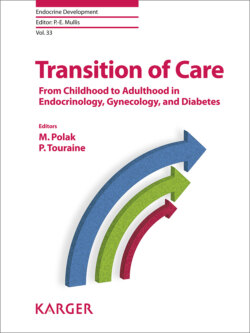Читать книгу Transition of Care - Группа авторов - Страница 38
На сайте Литреса книга снята с продажи.
Assessment of Adolescents and Adults during Transition from Pediatric Care
ОглавлениеThe management of adolescents with CAH presents unique challenges [56, 57]. The organization of transition is therefore important in order to support and encourage these patients in this stressful period. The major treatment goals during transition from pediatric to adult care are to allow a long-term follow-up of this chronic disease, to ensure that the CAH patient understands the issues of follow-up in adulthood, in order to minimize the long-term complications of GC therapy, to maintain fertility, and to optimize QoL [25]. Pediatric endocrine care of CAH patients is delivered through specialist services, and the recommendation is that patients with CAH should remain within specialist services as adults. The goal of transition is also not to lose follow-up. Transition of care is also a time when some patients stop adherence to their medication [56, 57]. Very few studies have examined transitional care and its determinants in real life. An assessment of a single center’s experience in the UK of transitioning patients with CAH to specialist adult services has highlighted that further work is required to improve health status at transfer and engagement with adult services [22]. Indeed, 50% of patients with CAH had poor biochemical control or adverse clinical consequences, and 50% who were transferred to specialist adult services were lost to follow-up. Introduction of a young person clinic increased the numbers of patients being transferred to specialist adult services but failed to improve engagement [22]. Although there is emerging evidence about how to organize transition, there is a need to identify which patients are at risk of drifting away from endocrine care and to evaluate the impact of a successful transition [22]. A recent study in the UK estimated the numbers of patients with CAH attending specialist adult services between 2 and 5%. Inadequate transition to adult services was emphasized as a potential explanation [15].
During transition between pediatric and adult specific care, a shift in treatment goals is thus needed [25] (Table 1). With adolescence, the patient must gradually assume primary responsibility for his/her care and stop seeing the pediatric endocrinologist. Extensive education of patients and coordination of services among health care providers for adults with CAH remains a major task during this period [7, 10]. The patients’ knowledge of the disease and their treatment should be evaluated [7, 10]. The transition process should be prepared and planned gradually in order to empower the adolescents to assume greater responsibility for their own health care. Successful transition from pediatric to adult health care requires a regular follow-up of patients by a multidisciplinary team including pediatric endocrinologists, urologists, gynecologists, psychiatrists, and adult endocrinologists [58]. All of this could be included in a specific therapeutic education program regarding transition and/or CAH [59]. We had previously reported on the evaluation of the transition process and on the needs expressed by patients with chronic endocrine conditions at transition [60]. This pilot study involving 13 CAH patients has shown that the vast majority of subjects had a good knowledge of their medication. Patients were also asked at the initial visits whether specific medical concerns about adult CAH had been properly addressed. Most women and all men were satisfied with the information received about fertility and genetic transmission to offspring [60].
